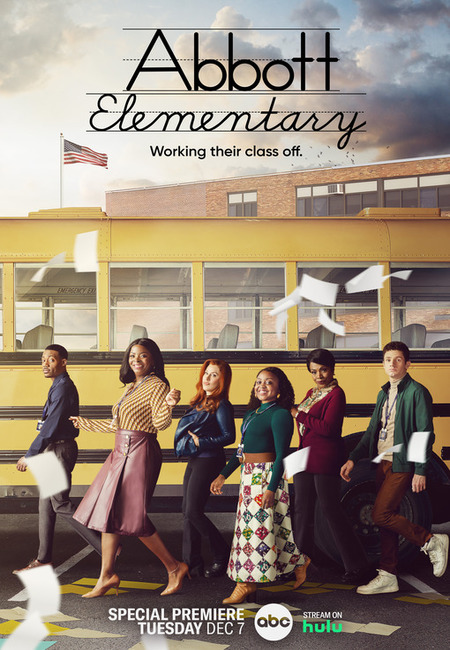When first you dive into the delightful surrounds of workplace sitcom, Abbott Elementary, which wholeheartedly embraces the “situation” part of the abbreviated genre name, it is easy to assume that you’re in for another light, fluffy, feel good show.
Nothing wrong with that at all; while the TV snobs among us may sneer, the truth is that sitcoms should be light and feel good inclined, especially if you take the “comedy” part of the naming equation seriously (being serious about good comedy? Damn straight you should be!).
It’s immediately obvious that the product of the humourously inspired mind of creator and star Quinta Brunson is nailing being funny, very funny, in fact; that’s clear within a scene or two of the pilot episode which, unlike many shows where the pilots are all about finding the show’s feet, feels as fully-formed, character rich and readily laugh-inducing as they come.
What emerges however as the thirteen episode first season plays out is that like Superstore before it, Abbott Elementary is a fiendishly clever show that seems light and simple on the surface, again admirably and pleasingly so, but which has a great deal going on below and above the surface.
Set in a socially disadvantaged part of Philadelphia, where every last cent must be accounted for and lavish educational programs are the stuff of fantasy and legend, Abbott Elementary takes a good, hard look at inequality in the American school system and how a manifestly inequitable system is only solved from total collapse by dedicated teachers who pour their hearts and souls, and risibly small salaries, into educating the children in their care.
Time and again we see the teachers struggling to get basics like rugs for the kids to have reading time on, or books for a reading & art challenge, all the while weaving educational magic out of the barest and most threadbare of materials, and it’s made clear in ways that are never heavy-handed but always salient and hard to ignore.
It’s a fine art indeed making a point in a sitcom without feeling grindingly polemic, or wearing out your messaging welcome, but Abbott Elementary does it with aplomb again, largely through the teaching staff, each of whom bring a perspective to the table that together paints a picture of a schooling system, down but not yet out.
Chief among a storied ensemble cast of talented performers is Quinta Brunson as Janine Teagues, an idealistic young teacher who is determined to make a difference in the lives of her second-grade students come what may.
Idealistic she may be, and honestly it’s a joy to watch her take on entrenched issues in the system, from slow maintenance schedules to behavioural issues among the kids, but experienced she is not, and unlike her veteran second-grade colleague Melissa Schemmenti (Lisa Ann Walter), who has some, ahem dubious connections to the less law-abiding sections of Philly society (which are often the difference between the school getting things or doing without) or 30-year-kindergarten teacher Barbara Howard (Sheryl Lee Ralph) who is tough but kindhearted, Janine has a lot of learning to do.
Learn she does, however, over the course of the season, along with other newbies, gay teacher Jacob Hill (Chris Perfetti), whose sexuality is not made a thing of and who refreshingly is treated just like the other straight characters – the days of LGBTQI+ people as the butt of easy jokes are over, thank the diverse god in the sky – and principal wannabe Gregory Eddie (Tyler James Williams), that it is possible to navigate a broken system without losing your commitment to educating the kids whose futures are very much in your hands.
Using a similar faux-documentary style to Parks and Recreation and The Office, Abbott Elementary deftly make stinging point after excoriating observation without once compromising the laughs that flow plentifully and from a buoyantly character-full well.
Much of the laugh-out loud humour comes courtesy of hapless principal Ava Coleman (Janelle James) who is as narcissistically self-centred as they come and thinks nothing of spending school funds on trivial things that burnish her ego and which do nothing to further the education of the school’s students.
So inept and clueless is she that she isn’t even aware that school starts at 7.30am and she barely survives a presentation for the next year’s funding requests, only pulling through with a combination of passion and weirdly on-point (for her) righteous anger.
She is hilarious and provides a person around whom the rest of the teachers can bond and form a family of sorts, which they do anyway simply because it is the only way to survive the many, sometimes comically surreal challenges that comes their way.
Thankfully Abbott Elementary is too well-written for Ava to be a cardboard cutout butt of jokes, and so even she finds her characters getting a nuanced rounding back, proof that the sitcom is never going to be one of those shows where nothing every changes and the same jokes are being told a few seasons in.
It’s unlikely Abbott Elementary will ever be that kind of sitcom; it’s gently humourous delivery belies a show that takes savage but illuminating swipes at a teaching system under great duress, and which is ever mindful, again like Superstore, that behind the plentiful laughs is an inequitable society barely getting by.
For all its cleverness and ripe sense of vibrant humour, the real joy in Abbott Elementary is how watching it feels like joining in with a close, warmhearted and endlessly supportive family, and a result, watching the show leaves you feeling buoyed and upbeat because no matter how bad things get (often at Janine’s well-intentioned hands), everyone always comes through for each other, a reassuring reminder that when you have people in your corner, pretty much anything is possible (bar getting new stickers; forget that, it ain’t happening … well, not straight away, anyway).
